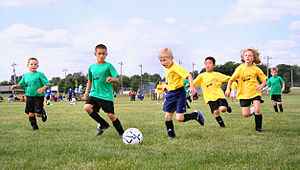
Back Аспорт Abkhazian Sport Afrikaans Sport ALS ስፖርት Amharic Esporte AN Plega ANG खेल ANP رياضة Arabic رياضة ARY رياضه ARZ


Sport is a form of physical activity or game.[1] Often competitive and organized, sports use, maintain, or improve physical ability and skills. They also provide enjoyment to participants and, in some cases, entertainment to spectators.[2] Many sports exist, with different participant numbers, some are done by a single person with others being done by hundreds. Most sports take place either in teams or competing as individuals. Some sports allow a "tie" or "draw", in which there is no single winner; others provide tie-breaking methods to ensure one winner. A number of contests may be arranged in a tournament format, producing a champion. Many sports leagues make an annual champion by arranging games in a regular sports season, followed in some cases by playoffs.
Sport is generally recognised as system of activities based in physical athleticism or physical dexterity, with major competitions admitting only sports meeting this definition.[3] Some organisations, such as the Council of Europe, preclude activities without any physical element from classification as sports.[2] However, a number of competitive, but non-physical, activities claim recognition as mind sports. The International Olympic Committee who oversee the Olympic Games recognises both chess and bridge as sports. SportAccord, the international sports federation association, recognises five non-physical sports: chess, bridge, draughts, Go and xiangqi.[4][5] However, they limit the number of mind games which can be admitted as sports.[1] Sport is usually governed by a set of rules or customs, which serve to ensure fair competition. Winning can be determined by physical events such as scoring goals or crossing a line first. It can also be determined by judges who are scoring elements of the sporting performance, including objective or subjective measures such as technical performance or artistic impression.
Records of performance are often kept, and for popular sports, this information may be widely announced or reported in sport news. Sport is also a major source of entertainment for non-participants, with spectator sport drawing large crowds to sport venues, and reaching wider audiences through broadcasting. Sport betting is in some cases severely regulated, and in others integral to the sport.
According to A.T. Kearney, a consultancy, the global sporting industry is worth up to $620 billion as of 2013.[6] The world's most accessible and practised sport is running, while association football is the most popular spectator sport.[7]
- ^ a b "Definition of sport". SportAccord. Archived from the original on 28 October 2011.
- ^ a b Council of Europe. "The European sport charter". Archived from the original on 6 June 2020. Retrieved 5 March 2012.
- ^ "List of Summer and Winter Olympic Sports and Events". The Olympic Movement. 14 November 2018. Archived from the original on 25 December 2018. Retrieved 5 March 2012.
- ^ "World Mind Games". SportAccord. Archived from the original on 8 May 2012.
- ^ "Members". SportAccord. Archived from the original on 7 May 2012.
- ^ "Women in sport: Game, sex and match". The Economist. 7 September 2013. Archived from the original on 2 August 2017. Retrieved 14 September 2017.
- ^ "The Most Popular Sports in the World". www.worldatlas.com. World Atlas. 2018. Archived from the original on 17 August 2018. Retrieved 17 August 2018.